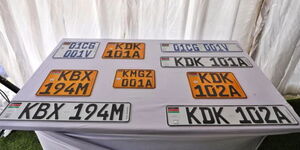Kenya continues to be one of the leading markets for second-hand vehicles.
Data from the Kenya National Bureau of Statistics (KNBS) indicates that imports for used cars in the nine months to September 2021 stood at 78,304 units.
This is a 21 per cent increase from 64,551 units imported in the same period in 2020. The average price for a used vehicle also rose to Ksh940,395 from Ksh868,780 as of September 2021.
The Kenya Revenue Authority (KRA) highlights the procedure for importing a motor vehicle, listing down guidelines that ought to be adhered to.
To be cleared for importation, the vehicle must comply with the Kenya Bureau of Standards (KEBS) requirements of Legal Notice No. 78 of July 15, 2005 (Verification of Conformity to Kenya Standards Imports Order, 2005).
It also must adhere to KS1515:2000 - Kenya Standard Code of Practice for Inspection of Road Vehicles.
In particular, the imported vehicle must be less than 8 years old from the year of first registration.
It will also be subject to roadworthiness inspection by a KEBS appointed inspection agent in the country of export such as Quality Inspection Services Japan (QISJ).
KEBS Pre-export Verification of Conformity to standards (PVOC Program) is a conformity assessment program applied to products in the respective exporting countries, to ensure their compliance with the applicable Kenyan Technical Regulations and Mandatory Standards or approved specifications.
Kenya also clears right-hand drive cars only as traffic laws only allow motorists to drive on the left side of the road.
Nonetheless, left-hand drive vehicles can only be imported for special purposes such as automobiles imported for projects and will be donated to the government eventually, ambulances and firefighters.
A motorist also pays some fees, including Import Declaration Fee (IDF), Import Duty, Excise Duty, VAT, Import Declaration Fee, Railway Development Levy among others.
The fees can be calculated via iTax on Customs & Border Control.
Documents Required
A motorist needs to attach the following among others requested.
Original Commercial Invoice
This is a legal document between the supplier and the customer that clearly describes’ the sold goods, and the amount due on the customer.
The commercial invoice is one of the main documents used by customs in determining customs duties.
Original Logbook From the Country of Importation
The National Transport and Safety Authority (NTSA) will issue you an original Kenyan Log Book in exchange for the cancelled original logbook from the country of importation.
Original Bill of Lading
This is a shipping document or a contract of carriage which serves as the title of the cargo and a shipment receipt.
It confirms the carrier’s receipt of the cargo.
Upon issuance of an original bill of lading, two other identical original bills of lading are printed and issued together as one single contract of carriage.
Pre-shipment Inspection Certificate
This document is also called the certificate of roadworthiness.
It is a trade document issued by an independent inspection agency to verify that goods conform with specifications stated on the sales contract and/or letter of credit.
Copy of your KRA PIN Certificate
Used to verify payment of taxes and compliance with KRA guidelines.
N/B: Use an auction sheet to assess the state of your car prior to purchase.
The sheet provides complete information about a unit, covering everything from scratches, major dents, and accidents history. It is created by an independent authority providing an unbiased assessment of the car on sale.












